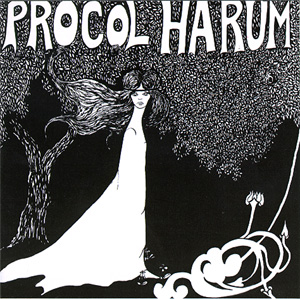Procol HarumBeyond |
|
|
PH on stage | PH on record | PH in print | BtP features | What's new | Interact with BtP | For sale | Site search | Home |
|
 The two
most important tracks are the first two that come up on the newer release of the
album. When Procol Harum first came out, the [sic]
left the best track A Whiter Shade Of Pale off the record (for the sake
of selling singles, one might surmise [unless one knew the
chronology]) but the new edition is clever enough to start the record off
on its best note; an organ driven ballad that takes more than a few notes from
Bach. A Whiter Shade of Pale is one of the band's best known songs, so it
comes as something of an irony that the central idea that surrounds [?]
the song is derived from JS Bach's compositions. All the same, the band is
lauded for incorporating classical music into the rock format, and there are
some very poetic lyrics here, although the vocals of Gary Brooker can get a
little strained when he tries to hit the high notes of the chorus. Then there is
Conquistador, a more upbeat track that I have previously heard to death
on FM radio, and didn't care for too much. It is a memorable track however,
although I cannot say that I find myself particularly enthused when it rolls
around.
The two
most important tracks are the first two that come up on the newer release of the
album. When Procol Harum first came out, the [sic]
left the best track A Whiter Shade Of Pale off the record (for the sake
of selling singles, one might surmise [unless one knew the
chronology]) but the new edition is clever enough to start the record off
on its best note; an organ driven ballad that takes more than a few notes from
Bach. A Whiter Shade of Pale is one of the band's best known songs, so it
comes as something of an irony that the central idea that surrounds [?]
the song is derived from JS Bach's compositions. All the same, the band is
lauded for incorporating classical music into the rock format, and there are
some very poetic lyrics here, although the vocals of Gary Brooker can get a
little strained when he tries to hit the high notes of the chorus. Then there is
Conquistador, a more upbeat track that I have previously heard to death
on FM radio, and didn't care for too much. It is a memorable track however,
although I cannot say that I find myself particularly enthused when it rolls
around.|
PH on stage | PH on record | PH in print | BtP features | What's new | Interact with BtP | For sale | Site search | Home |